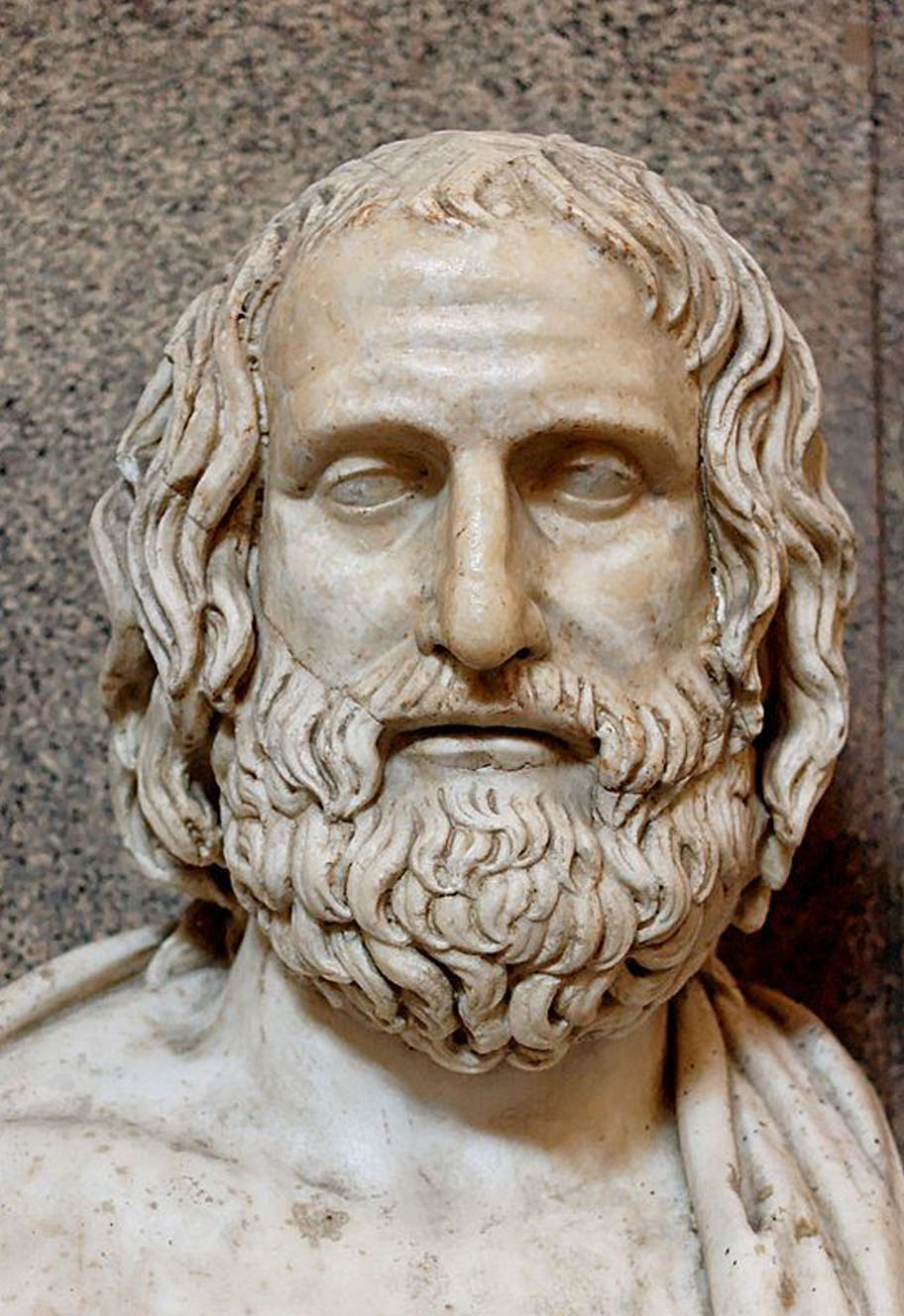Euripides
Born:
C. 480 BCE
Died:
406 BCE
Euripides was one of the three great tragedians of ancient Greece, along with Aeschylus and Sophocles. He wrote numerous plays, many of which have survived, and his works often explored complex characters and controversial themes. Euripides is known for his innovative approach to tragedy and his ability to challenge conventional ideas of morality and divine intervention. Here are some key aspects of Euripides' life and contributions:
Life and Background: Euripides was born in Salamis, near Athens, around 480 BCE. Little is known about his early life, but he is believed to have come from a wealthy family.
Dramatic Style: Euripides' plays often deviated from traditional tragic conventions. His characters were more psychologically complex, and he introduced elements of realism, making his works more relatable to the audience. He was criticized by some for challenging the traditional portrayal of gods and heroes in tragedy, often depicting them in a more human light.
Famous Works:
- Medea: One of Euripides' most famous plays, "Medea," tells the story of a woman who seeks revenge against her husband by committing horrific acts. The play explores themes of betrayal, vengeance, and the consequences of extreme actions.
- The Bacchae: This play explores the introduction of the cult of Dionysus to Thebes and the tragic consequences that follow. It delves into the nature of belief, ecstasy, and the dangers of resisting change.
- Electra: Euripides' version of the Electra myth focuses on the psychological impact of the murder of Agamemnon on his daughter Electra and her desire for revenge.
Humanitarian Values: Euripides was known for his humanitarian values and sympathy for the suffering of women and slaves. His plays often criticized the injustices and cruelties of war and societal norms.
Controversial Themes: Euripides explored controversial themes, such as the role of women in society, the consequences of war, and the questioning of traditional religious beliefs. This made him less popular with some conservative audiences of his time.
Awards and Recognition: Euripides won fewer dramatic competitions compared to Aeschylus and Sophocles. However, he did achieve posthumous acclaim, and his works continued to be appreciated in later periods.
Death: Euripides died in Macedonia in 406 BCE. According to some accounts, he left Athens during the Peloponnesian War and spent his final years in the court of King Archelaus II.
Euripides' innovative and questioning approach to tragedy has made him a compelling figure in the history of Greek drama. Despite facing criticism during his lifetime, his works have continued to be studied, adapted, and performed, influencing later playwrights and contributing to the evolution of dramatic storytelling.

Quick Facts
- Euripides was known for his unconventional and sometimes controversial ideas, making him less popular during his lifetime.
- His plays often deviated from traditional tragic conventions, featuring more psychologically complex characters and elements of realism.
- Euripides explored controversial themes, such as the role of women in society, the consequences of war, and the questioning of traditional religious beliefs.
- Despite winning fewer dramatic competitions, Euripides achieved posthumous acclaim, and his works continued to be appreciated in later periods.
Further Reading
Art &
Architecture
Ancient Greek art and architecture, with its harmonious proportions and timeless elegance, continue to inspire awe and admiration millennia later.
Discover
Greek Mythology & Mythical Characters
Greek mythology, a rich tapestry of gods, heroes, and mythical creatures, captivates the imagination with its tales of love, betrayal, and epic adventures that delve into the depths of the human psyche.
Discover
Ancient Greek History
Ancient Greek history, marked by remarkable achievements in democracy, philosophy, and warfare, shaped the foundation of Western civilization, leaving an indelible legacy of innovation and cultural influence that continues to resonate to this day.
Discover
Ancient Greek Olympics
The ancient Greek Olympics, held in Olympia every four years, celebrated athleticism, unity, and cultural pride, serving as a testament to the enduring spirit of competition and excellence that transcends time and borders.
Discover
Ancient Greek Wars
Ancient Greek wars, such as the Persian Wars and the Peloponnesian War, were pivotal conflicts that shaped the course of history, highlighting the struggle for power, independence, and the clash of civilizations in the ancient Mediterranean world.
Discover
Ancient Greek Culture and Society
Ancient Greek culture and society, characterized by its emphasis on art, philosophy, and civic engagement, fostered a vibrant intellectual and social landscape where innovation flourished, democracy thrived, and the pursuit of knowledge and excellence was celebrated as fundamental values of civilized life.
Discover